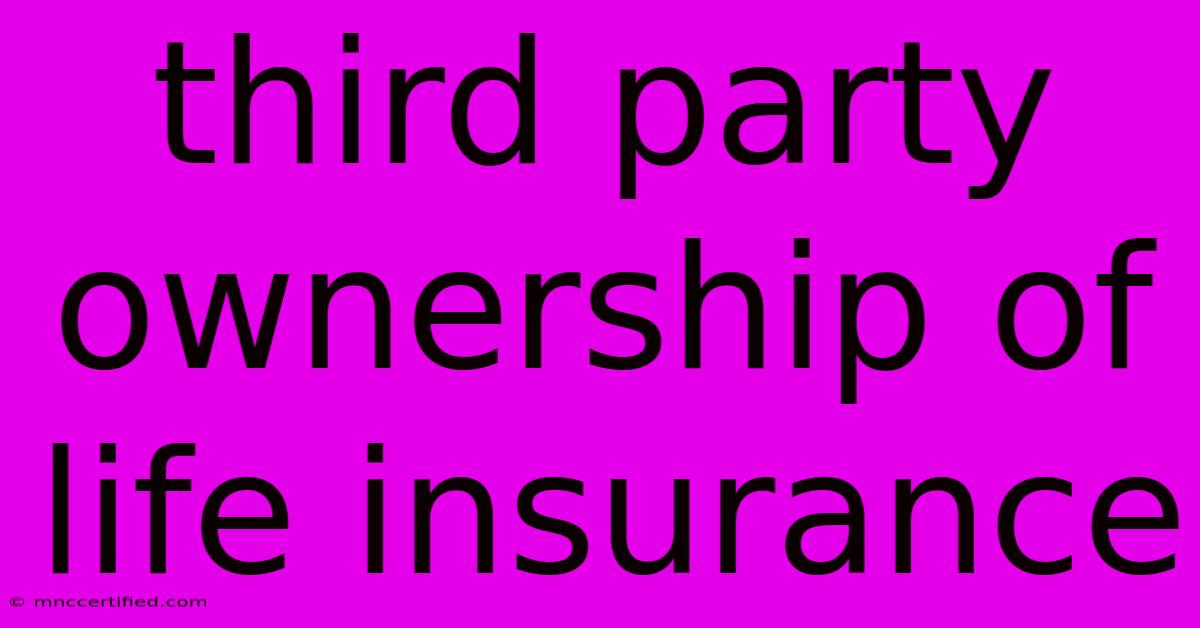Third Party Ownership Of Life Insurance

Table of Contents
Third-Party Ownership of Life Insurance: A Comprehensive Guide
Life insurance is a vital financial tool, providing a safety net for loved ones in the event of your passing. But did you know that someone other than the insured can own the policy? This concept, known as third-party ownership, can offer numerous benefits and complexities that are crucial to understand.
This comprehensive guide will explore the ins and outs of third-party ownership, covering its applications, advantages, potential drawbacks, and essential considerations.
What is Third-Party Ownership?
In essence, third-party ownership means a person or entity other than the insured owns and controls the life insurance policy. This ownership can be vested in a spouse, child, business partner, trust, or even a corporation.
Common Applications of Third-Party Ownership
Here are some scenarios where third-party ownership becomes particularly relevant:
- Business Succession Planning: A business owner might purchase life insurance on a key employee or partner, naming the business itself as the beneficiary. This ensures the business receives funds upon the individual's death, enabling smooth ownership transition or covering financial obligations.
- Estate Planning: A parent can purchase life insurance on their child, naming themselves as the beneficiary. This allows them to receive the death benefit to cover funeral expenses or provide for the child's future.
- Gift Giving: You can gift a life insurance policy to a loved one, naming them as the beneficiary. This can be a strategic way to pass on wealth while minimizing estate tax implications.
- Debt Protection: A lender can require borrowers to purchase life insurance with the lender as the beneficiary. This ensures the loan is repaid in the event of the borrower's death.
Advantages of Third-Party Ownership
- Tax Advantages: The death benefit received by the policy owner is generally tax-free. This can be a significant financial advantage for beneficiaries, especially in situations where the insured individual had substantial assets.
- Control and Flexibility: The policy owner has complete control over the policy, including naming the beneficiary, making premium payments, and surrendering the policy.
- Gifting and Estate Planning: Third-party ownership allows for strategic estate planning and tax-efficient gifting. You can transfer wealth to beneficiaries without incurring gift tax consequences.
Potential Drawbacks of Third-Party Ownership
While third-party ownership offers advantages, it's crucial to be aware of potential drawbacks:
- Privacy Concerns: The policy owner may have access to personal information about the insured, such as medical history, which could raise privacy concerns.
- Limited Control for the Insured: The insured may have minimal control over the policy's terms, such as the beneficiary designation or surrender options.
- Potential for Abuse: In certain cases, the policy owner might exploit the insured's situation for their own gain.
Considerations for Third-Party Ownership
Before considering third-party ownership, it's essential to carefully evaluate:
- The Purpose of the Policy: Clearly define the reason for purchasing the life insurance and how third-party ownership aligns with your goals.
- The Relationship with the Policy Owner: Establish a solid understanding of the relationship between the insured and the policy owner.
- Legal and Tax Implications: Consult with legal and financial professionals to ensure the structure complies with all relevant laws and regulations.
- Transparency and Communication: Maintain open communication with the policy owner and insured to avoid any potential misunderstandings or conflicts.
Conclusion
Third-party ownership of life insurance can be a valuable tool for achieving various financial objectives. However, it's essential to understand its nuances, potential benefits, and drawbacks before making informed decisions. By carefully weighing these factors, you can ensure this approach aligns with your needs and safeguards the interests of all involved.
Always seek advice from qualified professionals, such as financial advisors and estate planning attorneys, to navigate the complexities of third-party ownership effectively.

Thank you for visiting our website wich cover about Third Party Ownership Of Life Insurance. We hope the information provided has been useful to you. Feel free to contact us if you have any questions or need further assistance. See you next time and dont miss to bookmark.
Featured Posts
-
How Much Do Karate Combat Fighters Make
Nov 08, 2024
-
Galatasaray Vs Tottenham Live Stream Details 11 6 24
Nov 08, 2024
-
Chelseas 20 Minute Salvo All 4 Goals
Nov 08, 2024
-
Thursday Night Football Bengals Vs Ravens
Nov 08, 2024
-
Gold Bond Building Products Mount Holly
Nov 08, 2024